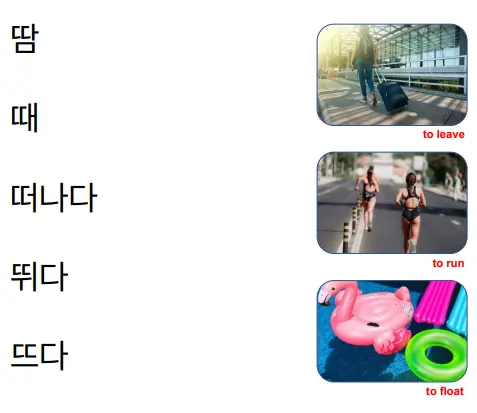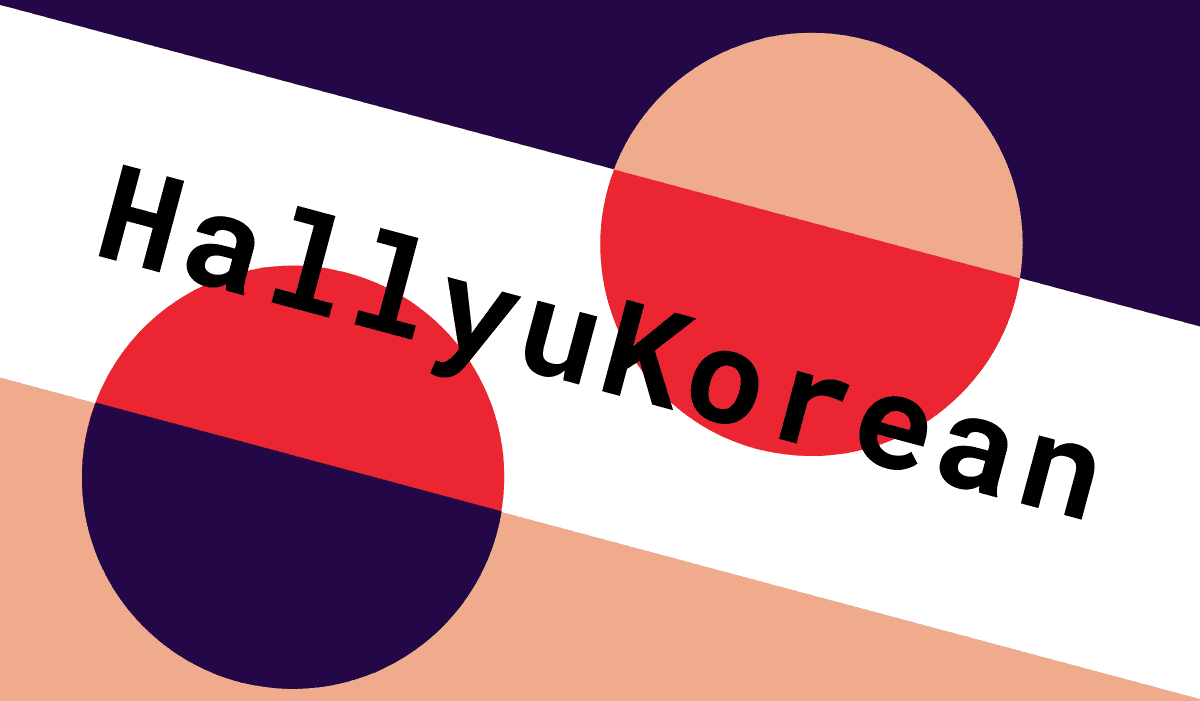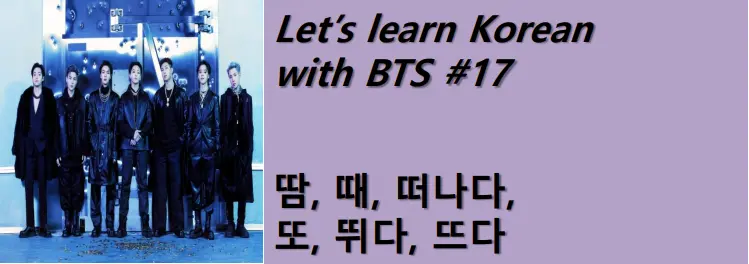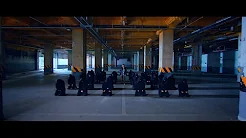Basic Korean words beginning with the consonant ㄸ([ssang-di-geut], [tt] sound)
Let’s learn Korean words 땀, 때, 떠나다, 또, 뛰다, 뜨다 with BTS lyrics.
Click on the image below to listen to all the BTS lyrics used in this post.
땀 [ttam] sweat

ⒷⓉⓈ 내 피 땀 눈물
nae pi ttam nun-mul
My blood, sweat and tears
*내(나(I) + 의(of), =내) +
피(blood) +
땀(sweat) +
눈물(tears)
때 [ttae] the time, time

ⒷⓉⓈ 너를 만날 때 가장 난 행복해
neo-reul man-nal ttae ga-jang nan haeng-bo-kae
I am the happiest when I meet you
*너(you) + 를(object particle) +
만날 때(만나다(meet) + ~ㄹ/을 때(~when)) +
가장(the most) +
난(나(I) +는(topic particle), =난) +
행복해(행복(happiness) + 하다(to be))
(*때 means time and ‘~ㄹ/을 때’ indicates a specific moment when something happens.
Sometimes 때 has the meaning of dirt, dead skin.)
떠나다 [tteo-na-da] to leave

ⒷⓉⓈ 내게서 떠나 떠나줘
nae-ge-seo tteo-na tteo-na-jwo
Get away from me
*내게서(나(I) + 에게서(from), =내게서) +
떠나(떠나다(leave) + 아(an imperative ending suffix)) +
떠나줘(떠나다(leave) + 주다(give) + 어(an imperative ending suffix))
또 [tto] again, and

ⒷⓉⓈ 난 널 몰라 또 넌 날 몰라
nan neol mol-la tto neon nal mol-la
I don’t know you and you don’t know me
*난(나(I) + 는(topic particle), =난) +
널(너(you) + 를(object particle), =널) +
몰라(don’t know) +
또(again) +
넌(너(you) + 는(topic particle), =넌) +
날(나(I) + 를(object particle), =날) +
몰라(don’t know)
뛰다 [ttwi-da] to run

ⒷⓉⓈ 날아갈 수 없음 뛰어
na-ra-gal su eop-sseum ttwi-eo
If you can’t fly, run
*날아갈 수(날아가다(fly) + ~ㄹ 수(dependent noun)) + 없음 (if not, =없으면) +
뛰어(뛰다(run) + 어(an imperative ending suffix))
(*’Verb stem + ~ㄹ 수 있다’ means ‘can’ and ‘Verb stem + ~ㄹ 수 없다’ means ‘can’t’.)
뜨다 [tteu-da] to float

ⒷⓉⓈ 둥 붕 뜬 기분 빙 도는 두 눈
dung bung tteun gi-bun bing do-neun du nun
I feel like I’m floating, both eyes spinning
*둥(float) +
붕(float) + 뜬(floating) +
기분(feeling) +
빙(around) + 도는(spinning) +
두(two) +
눈(eyes)
Grammar Reference
*Noun + ~은/는 : noun + topic particle
ex)난 : 나(I) + 는(topic particle)
넌 : 너(you) + 는(topic particle)
은 for nouns ending in a consonant, 는 for nouns ending in a vowel.
*Noun + ~을/를 : noun + object particle
ex)너를 : 너(you) + 를(object particle)
널 : 너(you) +를(object particle)
날 : 나(I) +를(object particle)
을 for nouns ending in a consonant, 를 for nouns ending in a vowel.
*Noun + ~의 : of
ex)내 : 나(I)+의(of)
*Noun + 하다 : verb
Many Korean nouns that indicate or describe an action or behavior can be combined with 하다 to form verbs.
In some cases, nouns can be turned into verbs by simply adding the verb 하다(to do, to be).
ex)행복(happiness) + 하다(to be, to do) = 행복하다(to be happy)
*Verb stem + 아/어/여라(an imperative ending suffix)
ex)떠나 : 떠나다(leave) + 아(an imperative ending suffix)
뛰어 : 뛰다(run) + 어(an imperative ending suffix)
Imperative form is used when you want to make a request or command.
아/어/여라 is an imperative ending suffix.
Quiz. Linking words to images

BTS music video to enjoy
Well done for making it this far.
Watch the Not Today music video above and see if you can hear “날아갈 수 없음 뛰어”, which you learned today.



